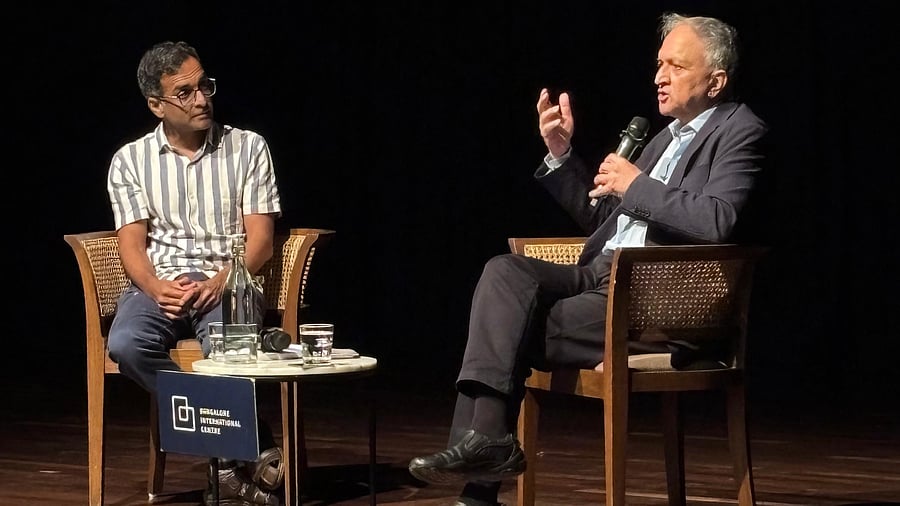
Historian Ramachandra Guha and moderator Arvind Narayan during the inaugural Justice Ahmadi Distinguished Lecture on ‘What would Ambedkar make of the republic of India today,’ in Bengaluru, on Saturday.
Credit: DH PHOTO
Bengaluru: Historian Ramachandra Guha on Saturday quoted Dr B R Ambedkar to warn about personality cults in politics that could lead to “degradation and eventual dictatorship.”
He also argued that the “harassment, stigmatisation and persecution of Indian Muslims” is more severe now than in the past, and stressed the need to address these disparities for India’s democracy to be truly inclusive.
He was delivering the inaugural Justice Ahmadi Distinguished Lecture, offering an examination of the Indian republic through the lens of Ambedkar’s ideas.
The lecture “What would Dr Ambedkar make of the republic of India today?” held at the Bangalore International Centre (BIC), served as a reminder of Ambedkar’s constitutional vision and his warnings on democratic challenges.
The National Law School of India University (NLSIU) and the Ahmadi Foundation organised the series to honour former Chief Justice of India Aziz Mushabber Ahmadi.
Guha praised Justice Ahmadi’s journey from a district court to the Supreme Court, noting his “intellectual and moral clarity” and important judgments on secularism, federalism and social justice.
Guha’s lecture explored Ambedkar’s concept of constitutional morality, defining it as a sentiment that “has to be cultivated”.
He quoted Ambedkar’s 1948 warning: “It is perfectly possible to pervert the Constitution without changing its form by merely changing the form of the administration.”
Guha connected this to present-day India, suggesting that attempts to control institutions like the bureaucracy, police and judiciary align with Ambedkar’s foresight.
The historian highlighted Ambedkar’s distinction between political equality and social and economic inequality. While India has the principle of ‘one person, one vote,’ the idea of ‘one person, one value’ remains unfulfilled for groups such as Dalits, women and Muslims.
Ambedkar’s opposition to one-party dominance and the importance of a functional opposition in parliamentary democracy were also discussed, with Guha pointing out the relevance of these concerns in India’s current political landscape. He asserted that Ambedkar would have equally opposed political parties being “family firms,” operating on hereditary principles.
While celebrating Ambedkar as an “emancipator of the oppressed” and a thinker on democracy, Guha cautioned against viewing him as omniscient.
He suggested that for issues concerning the rights of religious minorities, the legacies of Mahatma Gandhi and Jawaharlal Nehru offer equally important perspectives.
Guha concluded by urging a synthesis of these foundational leaders’ ideas to address India’s ongoing challenges.
